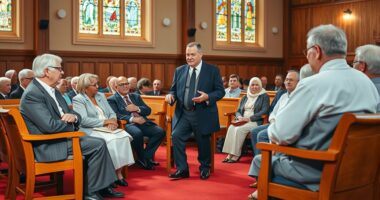You notice that pastors often define regular church attendance as attending every Sunday and participating in church events, focusing on physical presence and spiritual discipline. In contrast, members may see involvement as broader, including small groups, service projects, and community support, valuing meaningful engagement over strict attendance. These differing views stem from each group’s focus—pastors emphasize accountability, while members prioritize personal connection. Exploring these perspectives further reveals how they shape spiritual growth and community life.
Key Takeaways
- Pastors often see attendance as a measurable indicator of spiritual discipline, emphasizing physical presence.
- Members consider overall engagement, including participation in small groups and service, beyond just Sunday attendance.
- Pastors prioritize consistency and frequency as signs of commitment, while members value meaningful involvement over attendance records.
- Diverging perceptions stem from pastors focusing on observable attendance, whereas members emphasize relational and community involvement.
- Recognizing these differing definitions fosters mutual understanding and strengthens church community bonds.

Have you ever wondered what qualifies as regular church attendance? For many, it’s more than just showing up on Sundays; it’s a reflection of their spiritual engagement and community involvement. Pastors often see regular attendance as part of a person’s commitment to their faith journey, emphasizing consistency and participation in communal worship. They might view regular attendance as attending every Sunday, participating in church events, or engaging in small groups and ministries. To pastors, this consistency signifies a sincere desire to grow spiritually and stay connected to the church’s mission. They believe that regular involvement nurtures faith, provides spiritual nourishment, and strengthens the bonds within the congregation. Additionally, some incorporate seasonal influences such as special services or church activities aligned with holidays or church seasons to define regular participation.
Regular church attendance reflects spiritual commitment through consistency, participation, and connection within the faith community.
On the other hand, many church members have a more flexible or nuanced view. They might consider themselves regular attendees even if they miss a Sunday here or there due to work, travel, or family commitments. For them, spiritual engagement isn’t solely about frequency but about the quality of involvement. They might participate actively in prayer groups, volunteer regularly, or attend midweek Bible studies, which they see as equally essential to their spiritual growth. Community involvement plays a significant role in how they define their regularity; they feel connected through their participation in church activities, service projects, and fellowship events. This broader perspective recognizes that spiritual engagement can happen outside traditional service times and that meaningful involvement can take many forms.
The divergence in definitions often stems from how each person perceives their relationship with the church. Pastors may focus on attendance as a measurable indicator of commitment because it’s straightforward and easy to track. They see it as a way to foster accountability and ensure members are actively nurturing their faith. Members, however, might prioritize their overall engagement—whether through service, prayer, or community support—over strict attendance. They understand that spiritual growth isn’t just about being present physically but about cultivating ongoing connections and active participation in their faith community.
Ultimately, what counts as regular church attendance varies based on individual perspectives and priorities. Pastors tend to emphasize consistency and physical presence, viewing it as essential for spiritual discipline. Members, meanwhile, often see their involvement as a broader, more flexible concept rooted in meaningful engagement and community ties. Recognizing these different viewpoints helps both pastors and congregants appreciate each other’s understanding of what it truly means to be regularly involved in church life.
Frequently Asked Questions
How Do Cultural Differences Influence Attendance Expectations?
Cultural differences shape your attendance expectations by emphasizing varying levels of cultural observance and community engagement. In some cultures, regular church attendance is seen as an essential part of spiritual identity, so you might expect more consistent participation. In others, community involvement or cultural traditions influence attendance, leading to more flexible expectations. Understanding these cultural nuances helps you appreciate why attendance varies and encourages respectful engagement within diverse faith communities.
Do Age Groups Define Regular Attendance Differently?
You might find that different age groups see regular attendance as a moving target, like shifting sands. Younger members often view attendance through the lens of age norms, favoring flexibility, while older members might see it as a steadfast commitment. This leads to varying expectations of attendance frequency, with some prioritizing weekly visits and others feeling comfortable with less. Your understanding of these differences helps foster harmony within your congregation.
How Does Attendance Impact Church Leadership Roles?
Your attendance directly impacts your role in the church community and your ability to serve in spiritual leadership. Regular attendance shows commitment, builds trust, and helps you grow spiritually, which are essential qualities for leadership. When you consistently participate, you strengthen the church’s foundation and inspire others. Conversely, irregular attendance can hinder your influence and leadership opportunities, making it harder to fulfill your responsibilities within the church community effectively.
Are There Specific Denominations With Unique Attendance Standards?
Many denominations have unique attendance standards, reflecting their specific beliefs and community practices. For example, Catholic and Orthodox churches often emphasize regular participation in sacraments, while Baptist and Pentecostal groups may focus on consistent weekly attendance. These denomination variations in attendance policies aim to foster spiritual growth and community bonding. Understanding these differences helps you appreciate how each church tailors expectations to support its faith journey and congregational cohesion.
How Do Personal Circumstances Affect Attendance Expectations?
Your personal circumstances, like personal commitments and health limitations, shape how often you attend church. If you have a busy schedule or health concerns, you might attend less frequently, and that’s okay. Pastors often understand these challenges and may adjust expectations accordingly. Ultimately, your attendance reflects your commitment and circumstances, not just a set standard. Communicate openly with your church leaders about what works best for you.
Conclusion
So, understanding the different ways pastors and members define regular church attendance helps bridge the gap. For example, a member might attend once a month, while a pastor might see that as infrequent. If you see church as a place to grow spiritually, you might attend weekly, but if life gets busy, attending twice a month still counts. Recognizing these differences encourages grace and better communication within your faith community.










